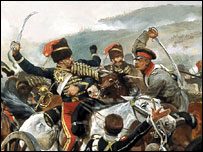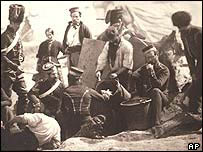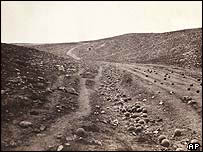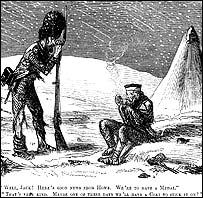October 25, 2004
Why the Charge of the Light Brigade still matters
On the 150th anniversary of the Charge of the Light Brigade, why should anyone still be interested in what was a relatively minor military blunder in a war long since overshadowed by the slaughter of the First and Second World Wars?

Thanks in no small part to the lines of Tennyson's poem - "Into the Valley of Death/Rode the six hundred... Cannon to the right of them/ Cannon to the left of them" - the Charge of the Light Brigade has long held its place in the public imagination. It is a symbol of heroic failure, a high-Victorian icon of self-sacrifice and devotion to duty.
This week the National Army Museum is commemorating the 150th anniversary of the charge, as part of a wider exhibition about the Crimean War.
"The British have always loved their defeats as much as their victories," says the exhibition's curator Alastair Massie. And the ill-fated cavalry charge appeals to our appetite for "glorious failure".
It was also an event that caught a world about to change - showing that chivalric cavalry charges and officers in full-dress uniforms were no match for modern fire-power.
"It was the most lethal costume party in history," he says.
Victorian media war
But Dr Massie says that much of the durability of the story is a legacy of its huge initial impact.

Crimea, 1855: Roger Fenton's photographs brought the war home
Crimea was the first media war. There were reporters and photographers capturing events in a way that had never happened before.
This brought the story of the light brigade's charge during the battle of Balaclava to the breakfast tables of Britain, only three weeks after it had happened.
And the breathless account of how a few hundred cavalrymen mounted a doomed charge against the Russian artillery was an emotional showstopper.
The poem by Lord Tennyson is often cited as sustaining the legendary status of the battle, but Mr Massie says the newspaper report came first - and it was this prose that inspired Tennyson's poetry.
This process of myth-making continued as painters began producing epic canvases depicting the headlong race towards the Russian guns.
'Sudden death'
But it was the news reporting of William Howard Russell which had set the story in motion. Confusion over cavalry orders in battle was not unique - but at Balaclava, for the first time, a journalist was there as an eye-witness to record soldiers "rushing to the arms of sudden death".

"The valley of the shadow of death" by Roger Fenton
"They swept proudly past, glittering in the morning sun in all the pride and splendour of war. We could scarcely believe the evidence of our senses! Surely that handful of men were not going to charge an army in position?
"Alas, it was but too true - their desperate valour knew no bounds, and far indeed was it removed from its so-called better part - discretion."
Public opinion was now part of the war - and from the outset this desperate attack was seen as a blunder.
But it was a gloriously executed blunder - and the men who took part in the charge acquired a kind of celebrity status, part of what William Howard Russell called a "band of heroes".
'Their's not to reason why'
In the decades following the battle, these old soldiers held well-publicised reunions - although Dr Massie says that sometimes the number of "survivors" attending exceeded the number who took part in the original charge. These reunions ran until 1913 - and the last veteran lived until 1927.

Cartoons raised public awareness of the poor conditions of soldiers
In the 20th Century, the image of military sacrifice acquired a very different character. In 1916, the Battle of the Somme saw 60,000 British casualties in a single day - and the poets of the First World War saw nothing heroic about such an appalling loss of life.
Tennyson wrote:
"Their's not to reason why,
Their's but to do and die."
And Kipling supplied a reply in a comment on WWI:
"If any ask us why we died,
Tell them 'Because our fathers lied'."
Re-interpretations of the Charge of the Light Brigade pointed up the failings of aristocratic, self-centred generals, who appeared to have little concern for casualties.
In the 1950s, the historian Cecil Woodham-Smith wrote The Reason Why, which blamed upper-class rivalries of Lord Lucan and Lord Cardigan for allowing the cavalry charge.
Not such a disaster
This view of distant, incompetent aristocrats ignoring the better judgement of professional soldiers was reinforced by the 1968 movie, The Charge of the Light Brigade.
But there have been more recent challenges to this - with military historian Terry Brighton saying the film owed "more to class war than the Crimean War".
Mr Brighton's book, Hell Riders: The True Story of the Charge of the Light Brigade, argued that the charge was much less of a military disaster than it might have appeared.
In numerical terms, the event would not have registered significantly on the casualty figures. There were 673 men in the charge - of which probably fewer than 200 died.
In contrast, during the Crimean War more than 16,000 soldiers died of diseases such as dysentery.
And Dr Massie says that it would be wrong to think only modern historians had established the failures of the military commanders.
At the time, Lord Cardigan was known to be a "blockhead" and Lord Lucan was considered a "pedant", says Dr Massie. The Crimean campaign followed 40 years without Britain fighting a European war - and Lord Lucan had returned after 17 years in retirement.
But the charge of the light brigade lives on as a phrase that has become part of the language - and an example of unthinking bravery - in an event which the Times recorded as an "atrocity without parallel".
By Sean Coughlan
BBC News Online Magazine Posted by thinkum at October 25, 2004 02:05 PM
Consciousness is a word worn smooth by a million tongues. by online poker
Posted by: free online poker at December 28, 2004 08:41 AMparadise poker - empire poker, free poker online | poker tournaments - online poker sites, partypoker | empirepoker - poker tournaments, poker books | online poker sites - wsop, poker tournaments | empire poker - poker tips, empirepoker | partypoker - empirepoker, internet poker | poker tips - wsop, internet poker | free online poker - poker tables, poker supplies | online poker rooms - world poker tour, poker tournaments | poker tables - WPT, poker chips | WPT - texas holdem poker, texas holdem poker | online poker - poker tournaments, world poker tour | party poker - free poker online, poker tournaments | poker tips - internet poker, poker stars | world poker tour - online poker, texas holdem poker | wsop - texas hold'em poker, poker | online poker - poker rooms, poker tournaments | internet poker - poker online, poker tournaments
Posted by: paradise poker at February 17, 2005 01:23 PM